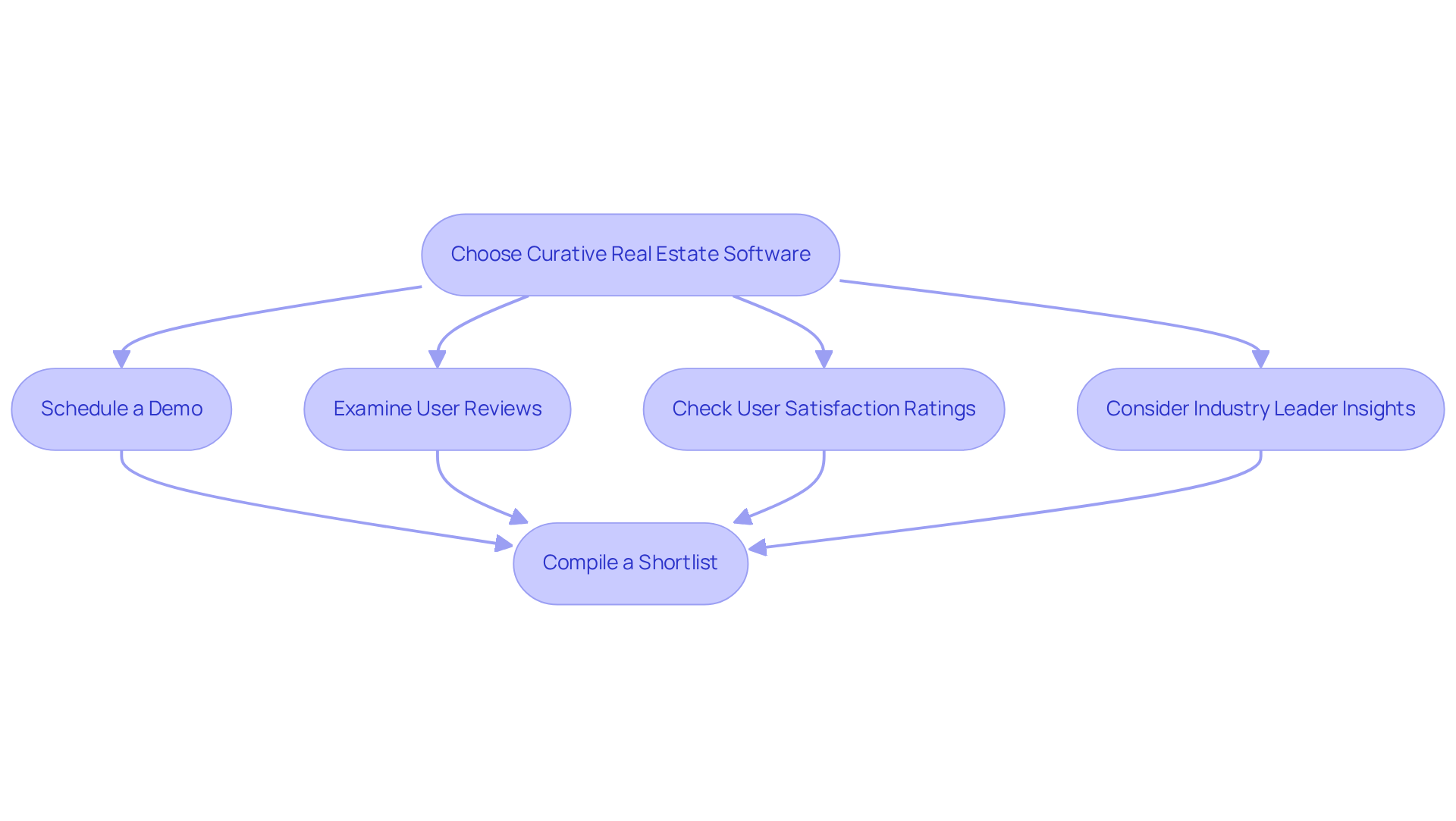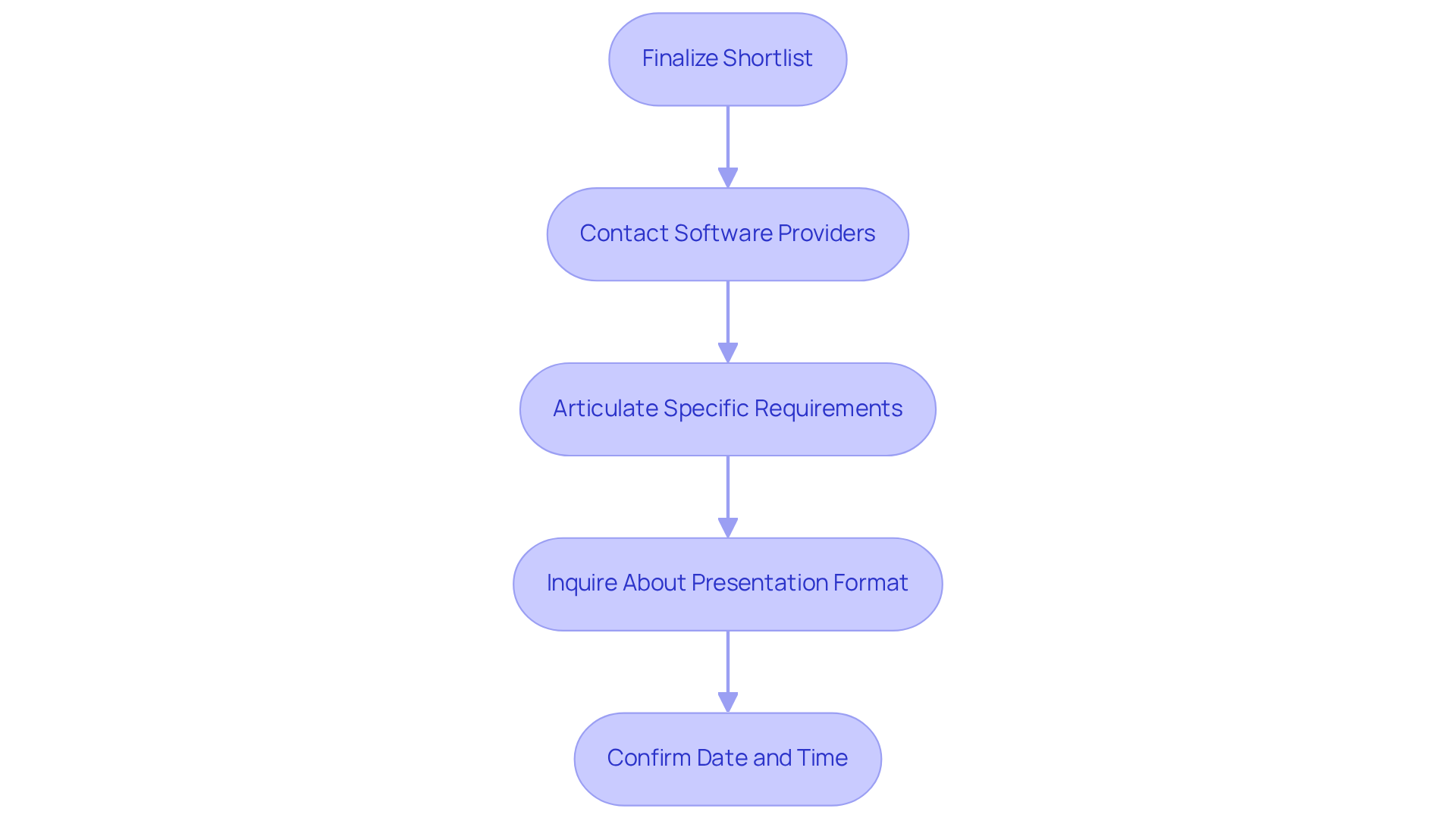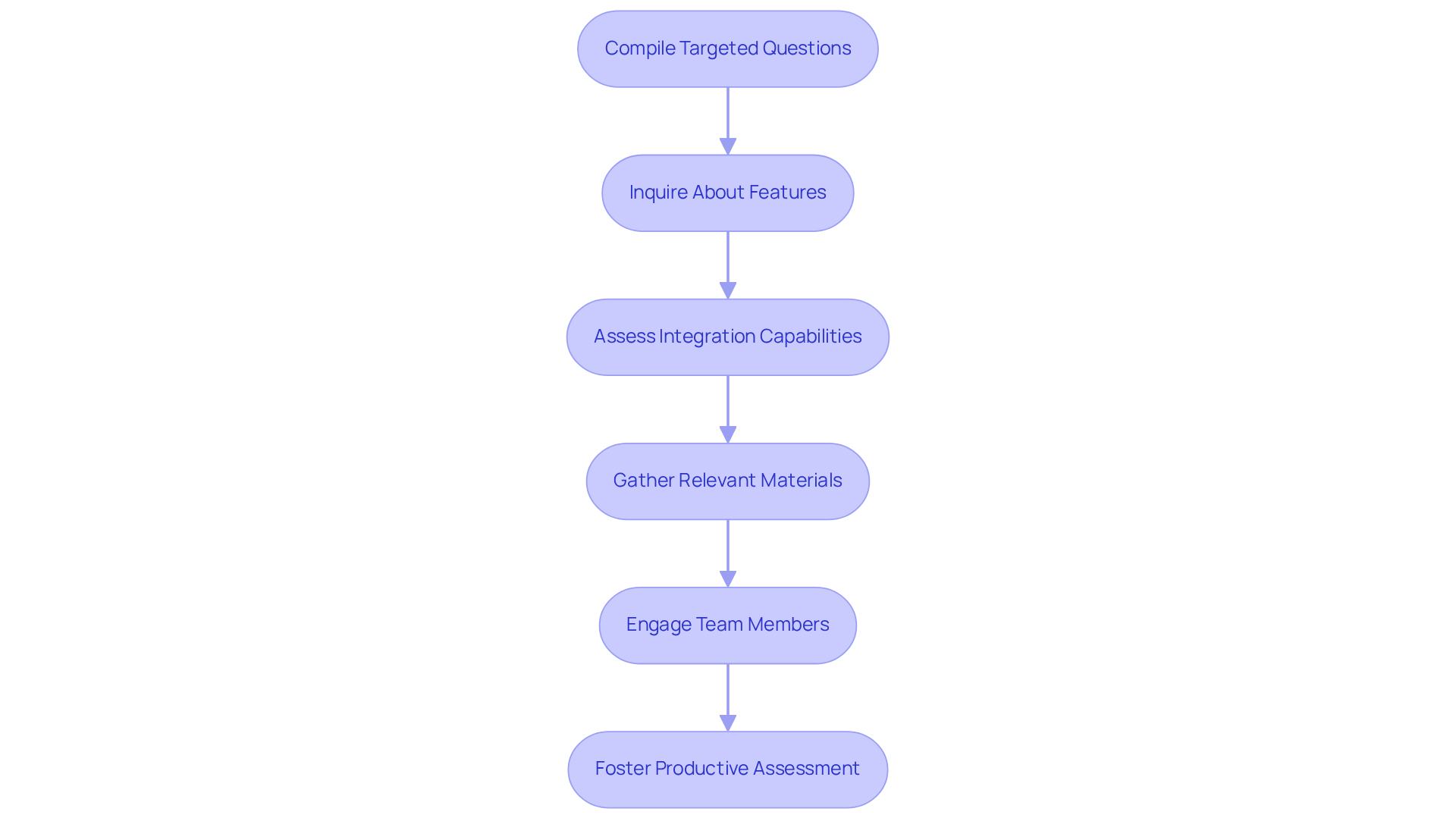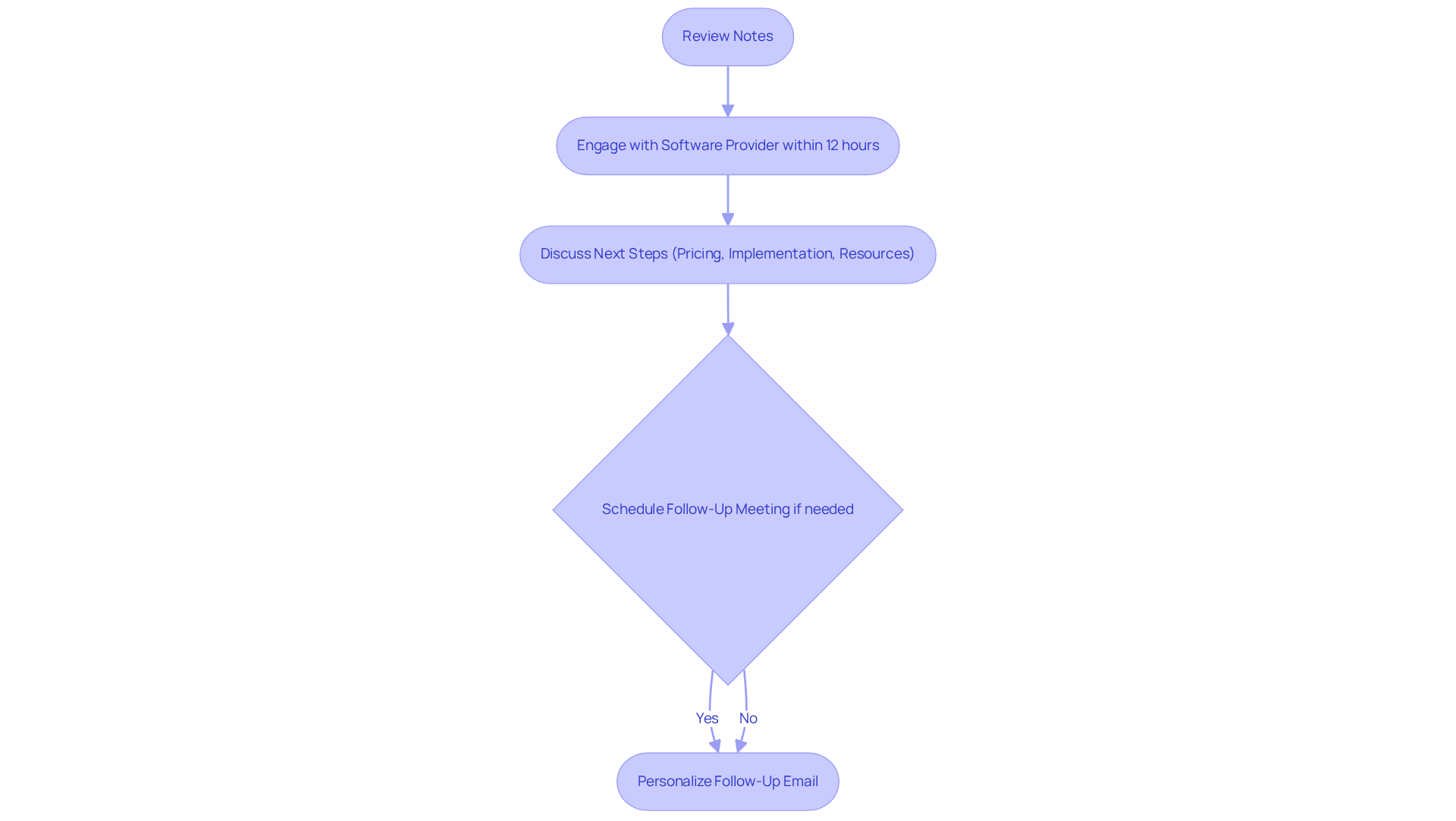Overview
The article delineates a comprehensive five-step process for scheduling a demo of curative real estate software. This process encompasses:
- Identifying needs
- Selecting the appropriate software
- Contacting providers
- Preparing pertinent questions
- Following up post-demo
Each step underscores the necessity of establishing clear objectives and fostering effective communication, ensuring that the demo aligns with specific operational requirements. Ultimately, this meticulous approach facilitates informed decision-making regarding software selection.
Introduction
Navigating the complexities of real estate transactions can be daunting, particularly when selecting the right software to streamline processes such as title research and property ownership verification. The right curative real estate software significantly enhances efficiency, reduces errors, and fosters collaboration among team members. However, how does one effectively schedule a demo that not only meets specific operational needs but also aligns with strategic goals? This guide outlines five essential steps to help professionals confidently navigate the demo scheduling process, ensuring informed decisions that drive success in their real estate endeavors.
Identify Your Needs and Goals for the Demo
Begin by assessing your current challenges in title research and . Consider the specific features you require from the curative real estate application, and schedule a demo for to assess options such as , compliance tracking, or integration with existing systems. Clearly articulate your objectives for the presentation, including improving efficiency, , or . This clarity will facilitate effective communication with and ensure that you can that meets your needs.
Establishing these objectives is essential for enhancing the value of the demonstration and aligning it with your strategic aims when you schedule a demo for curative real estate software, as highlighted by industry specialists. A report indicates that businesses adopting management systems can achieve a 40% reduction in costs associated with paperwork, underscoring the importance of . Furthermore, 72% of firms believe that digital filing processes mitigate business risk, further emphasizing the necessity of in risk management.
Utilizing solutions like Dotloop or PandaDoc illustrates how document management systems enhance efficiency and collaboration.
Choose the Right Curative Real Estate Software
When selecting curative real estate applications, it is vital to explore various options and for that specialize in title research. Focus on applications that not only align with your operational requirements but also offer an intuitive interface, robust , and flexible pricing models. Scalability is a critical factor, ensuring that the system can grow alongside your business.
To evaluate the effectiveness of different solutions, you should:
- Schedule a demo for curative real estate software.
- Examine user reviews and case studies that demonstrate how other real estate professionals have successfully utilized these applications.
- Pay attention to , as they provide valuable insights into the application's performance and reliability.
- Consider insights from industry leaders regarding the essential features that enhance , such as and comprehensive data access.
By compiling a shortlist of service providers based on these criteria, you can streamline your presentation scheduling process and identify the optimal choice for your needs.

Contact the Software Provider to Schedule the Demo
Upon finalizing your shortlist, it is imperative to reach out to the to for . Utilize their website or customer service contact information for this purpose. Clearly articulate your and the objectives you aim to achieve from the presentation. Inquire about the format of the presentation—whether it will be live or recorded—and its expected duration. Confirm a date and time that aligns with your schedule to for curative real estate software, ensuring that all are invited to participate. is paramount; as industry specialists emphasize, a can significantly enhance the and facilitate improved decision-making.

Prepare Questions and Materials for the Demo
Before the demonstration, it is essential to compile a targeted list of questions that align with your . Inquire about the application's features, user-friendliness, , and the level of . Notably, 39% of organizations consider integration capabilities a critical factor when selecting applications, making it imperative to understand how the solution can interface with existing systems. Furthermore, 25% of executives indicate that their CRM systems lack sufficient integrations, highlighting the importance of this aspect in the evaluation process.
Prepare relevant materials that can effectively illustrate or challenges, such as or examples of title documents. Engaging team members during the demonstration can illuminate practical challenges and ensure the application meets various operational requirements. This preparation not only streamlines the discussion but also guarantees that the presentation effectively addresses your . By interacting with the presentation group using these insights, you can foster a more productive assessment of the program's suitability for your organization.

Follow Up and Evaluate the Demo Experience
Following the demo, it is essential to of the experience. Begin by reviewing your notes to assess how effectively the program met your specific requirements and goals. Engage with the promptly—ideally within 12 hours—to that may have arisen during the demonstration. This communication should encompass a , including pricing, , and any additional resources available to you.
Furthermore, if a has not been scheduled, consider arranging one to ensure that all your concerns are addressed. A timely follow-up not only reinforces your understanding but also plays a pivotal role in your decision-making process. Remember, 75% of prospects indicated that a presentation enhanced their likelihood of purchasing, underscoring the significance of this phase in the sales journey.
In addition, personalize your based on the specific conversation during the demo and express gratitude for the prospect's time; these practices foster rapport and enhance conversion chances.

Conclusion
Scheduling a demo for curative real estate software is a strategic endeavor that can greatly enhance operational efficiency and decision-making. By clearly identifying needs and goals, selecting the right software, and preparing effectively, organizations ensure they maximize their demonstration experience. This method not only streamlines the evaluation of software options but also aligns the demonstration with the specific objectives of the business.
Key steps have been outlined throughout this article to facilitate this process:
- Assessing current challenges
- Selecting suitable software options
- Preparing targeted questions
- Following up after the demo
Each phase is crafted to maximize the value of the presentation. Engaging with software providers and leveraging insights from industry specialists further increases the likelihood of discovering a solution that meets organizational needs.
Ultimately, the significance of thorough preparation and effective communication cannot be overstated. Dedicating time to assess needs, evaluate software options, and engage in meaningful follow-up discussions will not only enhance the demo experience but also empower businesses to make informed decisions. By embracing these best practices, organizations pave the way for improved efficiency and reduced risks in real estate operations, driving long-term success in a competitive landscape.
Frequently Asked Questions
What should I do before scheduling a demo for curative real estate software?
Begin by assessing your current challenges in title research and property ownership verification. Identify the specific features you need, such as document management or compliance tracking, and articulate your objectives for the demo, like improving efficiency or reducing errors.
Why is it important to establish objectives for the software demonstration?
Establishing objectives is essential for enhancing the value of the demonstration and aligning it with your strategic aims. Clear objectives facilitate effective communication with the service provider and ensure that the demo meets your needs.
What are some benefits of adopting management systems in real estate?
Businesses adopting management systems can achieve a 40% reduction in costs associated with paperwork. Additionally, 72% of firms believe that digital filing processes mitigate business risk.
What features should I look for when choosing curative real estate software?
Look for applications that align with your operational requirements, offer an intuitive interface, robust customer support, flexible pricing models, and scalability to grow with your business.
How can I evaluate the effectiveness of different curative real estate software solutions?
To evaluate effectiveness, schedule demos, examine user reviews and case studies, pay attention to user satisfaction ratings, and consider insights from industry leaders on essential features like advanced search capabilities.
What role do document management systems play in real estate?
Document management systems enhance efficiency and collaboration, as illustrated by solutions like Dotloop or PandaDoc, which streamline processes in title research and property ownership verification.




